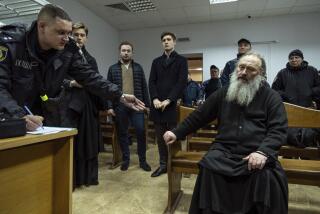Ancient Tradition at Turkish Monastery Comes Under Siege
- Share via
MIDYAT, Turkey — Tucked amid rugged mountains where Kurdish separatists are fighting the Turkish army, the ancient Syrian Orthodox monastery here usually draws only a trickle of intrepid Christian pilgrims. But lately, a new kind of visitor is turning up.
These days, Turkish secret police and government inspectors arrive several times a month. They are trying to stamp out a 1,600-year-old tradition at Mor Gabriel, the world’s oldest functioning monastery, of teaching children the Syrian Orthodox faith and the Aramaic language.
“Should the authorities pursue this ban,” said Timoteus Samuel Aktas, the archbishop responsible for the monastery, “we won’t be able to train new priests.”
Clutching a heavy silver crucifix encrusted with purple stones, Aktas added, “I’ll die before I allow that to happen.”
Founded in AD 397, Mor Gabriel is the spiritual home of the estimated 3 million Syrian Orthodox Christians scattered across the world. Until the 12th century, Christian families sent their firstborn sons here to train as monks, priests or teachers. Then Turkey came under Islamic rule, and the monastery, a target of frequent Muslim raids, fell into disuse and became a cowshed for Kurdish farmers.
Turkey’s 20,000-member Syrian Orthodox community was allowed to revive Mor Gabriel in the 1920s after the birth of the modern Turkish republic. But under the republic’s secularist rules, Mor Gabriel’s monks were legally barred from teaching their religion and their language, which is believed to have been spoken by Jesus.
In practice, however, for decades, authorities looked the other way as Christian boys came for evening lessons at the monastery after attending state schools during the day. Monastery graduates include the Syrian Orthodox archbishop of Los Angeles, Eugene Kaplan.
That official tolerance ended late last year with the first of a series of demands to stop the lessons.
Asked about the crackdown, government officials say they are simply enforcing a law barring any form of education that is not regulated by the state. They will not explain why they decided only recently to enforce the ban.
Many Christians say they believe that the decision was made by Islamic zealots who remained in the bureaucracy here in Mardin province after Turkey’s Islamist-led government resigned in June 1997. They say the Islamists view the Syrian Orthodox monks as rivals who convert Muslims to their own faith.
John Shattuck, the assistant U.S. secretary of State for human rights, told reporters in February that the Islamist provincial governor, Fikret Guven, had assured him that the pressure on Mor Gabriel would end.
It has not. The governor’s office has since ordered all restoration work at the monastery stopped.
Aktas says inspectors have filmed and measured practically every square inch of the sand-colored complex and have returned to make sure nothing has changed.
The religious and language instruction continue but are interrupted whenever the monks spot a government vehicle climbing the hill. Provincial authorities have threatened legal action unless the archbishop sends home the 30 pupils who board here.
An exotic figure in his flowing scarlet habit and embroidered black skullcap with earflaps, Aktas points to newly restored Byzantine mosaics speckling the ceiling of a small chapel where he had just said Mass.
“We thought they would applaud our efforts to preserve a treasure that belongs to all Turks,” he said. “Instead, they told us we were breaking the law.”
The monastery is also hurt by a law allowing only Turkish citizens to serve as priests. Immigration to Europe and the United States in recent decades, Atkas said, has reduced the region’s Syrian Orthodox population from 50,000 to fewer than 3,000. With only eight priests left, he said, he is facing a “serious personnel problem.”
The exodus has picked up because of fighting between the army and Kurdish guerrillas, who are Muslim.
Residents of Haberli, a small Christian village 12 miles from the monastery, said they feel pressure from both sides to join the conflict. Visitors must register at a military checkpoint before entering the village, which is guarded by a tank.
More to Read
Sign up for Essential California
The most important California stories and recommendations in your inbox every morning.
You may occasionally receive promotional content from the Los Angeles Times.













